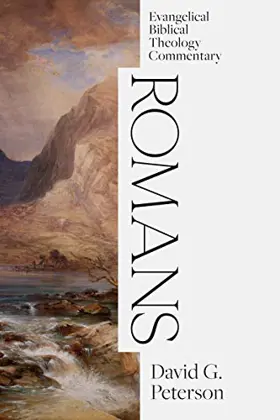

Romans
in Evangelical Biblical Theology Commentary
Pages
688
Publisher
Lexham Press
Published
12/13/2020
ISBN-13
9781683594277
Of all of Paul's letters, Romans is the most immersed in the Old Testament.
Romans declares that God’s promises are fulfilled in Jesus. David G. Peterson situates Romans within the grand redemptive story of the Old Testament: creation, fall, Israel, exile, and promised redemption in the Messiah. Peterson reads Romans as Paul’s exposition and defense of the gospel and highlights its unique theological insights into the Trinity, righteousness and justification, Israel and the church, apostolic ministry, and true worship and holy living.
Romans declares that God’s promises are fulfilled in Jesus. David G. Peterson situates Romans within the grand redemptive story of the Old Testament: creation, fall, Israel, exile, and promised redemption in the Messiah. Peterson reads Romans as Paul’s exposition and defense of the gospel and highlights its unique theological insights into the Trinity, righteousness and justification, Israel and the church, apostolic ministry, and true worship and holy living.
Collections
This book appears in the following featured collections.
- Recommended New Testament Commentaries for Evangelical Pastors by Thomas R. Schreiner
Reviews
Most see the Letter to the Romans as a dense, treatise of Paul's theology shape by a lifetime of missionary work. David G Peterson rightly contends that Romans must be read within its original context, "as a letter addressed to first-century Christians in the capital of the Roman Empire." While it is theological and contains some of the richest summation of Paul's theology, it contains much more. Three critical issues are seen: the gospel, Jesus Christ as the focus of the gospel, and the exposition and spread of the gospel. Furthermore, several significant biblical theology themes emerge.
"Romans shows us how to the the Scriptures appropriately, revealing how the Old Testament is fulfilled in the New and demonstrating that the gospel cannot be adequately grasped and related to our world unless it is understood in light of its Old Testament root."
The Evangelical Biblical Theology Commentary (EBTC) focuses on the Biblical Theology expressed by their authors on their own terms and in their own historical contexts. Biblical Theology seeks to trace the central themes of the individual books of Scripture. This commentary intends to communicate the worldview of the biblical authors and how the original audience would understand the text. In focusing on the Biblical themes instead of a verse-by-verse exegesis, you begin to see the bigger story of Scripture as it was understood when it was written.
"A distorted view of God brings a distorted view of human beings, made in the image of God (Gen 1:26-27), meaning that the proper use of our bodies in human relationships becomes obscured."
Each author of the EBTC volumes is given freedom in the order and structure to best suite the biblical material being presented. Peterson has arranged the commentary with an introduction, Biblical Theology themes, and finishing with verse-by-verse commentary. It utilized the Christian Standard Bible (CSB) as the base translation. The commentary uses extensive footnotes rather than parenthetical citations and asides to keep from breaking up the text; I find this makes the text much more readable. The binding and cover art provide for a quality and aesthetically pleasing addition to anyone's library.
David G. Peterson (PhD, University of Manchester) is emeritus faculty member at Moore Theological College in Sydney and previously was principal of Oak Hill College, London. He is the author of several books, including Possessed by God (New Studies in Biblical Theology), Hebrews (TNTC), and Acts (Pillar). Peterson is an ordained minister of the Anglican Church of Australia.
Romans is one of my favorite books of the bible, I contently find myself amazed by the way that it speaks to me every time I read through it. Peterson's commentary on Romans was less impactful on me than other commentaries and studies on Romans. It is theologically accurate and well written but lacking in its depth in the Introduction and Biblical and Theological Theme section. The Biblically and Theological Theme section did not seem to draw out new or insightful revelations of Romans for me. There is so much to mine from the depths of Romans, it left me wanting more substance. While the Biblical and Theological Theme section was adequate, the verse-by-verse exposition is excellent. The verse-by-verse exposition overwhelming comprises most of the commentary page count. Therefore, it still makes this commentary a great resource and helpful. It has a solid place in my library and I will certain use it often.
I received a free copy in exchange for my honest review. The opinions I express are my own and I was not required to write a positive review.
[Full Review]
